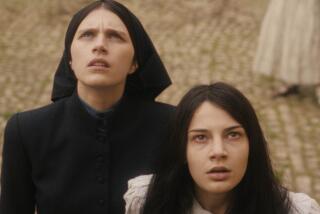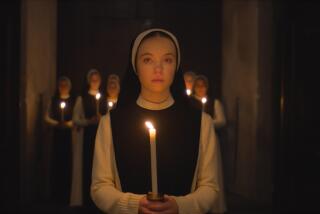Review: ‘Mary Magdalene’ is a graceful portrait of a foundational figure in Christianity
The most emotionally violent scene in “Mary Magdalene,” an imperfect but affecting vision of New Testament times, depicts not a crucifixion but an exorcism — or rather, a failed attempt at one. Mary (Rooney Mara), a young woman from the Galilean fishing village of Magdala, is awakened in the middle of the night and brought down to the shore, where her father and brothers plunge her repeatedly into the sea, crying out for the demon that has possessed her to release her from its grip.
The Gospel of Luke notes that Mary Magdalene at one point had seven demons driven out of her, but there are none to be found in this gently revisionist retelling, a 2016 production from the now-defunct Weinstein Company arriving in theaters in time for the Easter season. What the men of Magdala have mistaken for an evil spirit is instead a spirit of quiet, principled resistance: Mary has no interest in marrying, and her love for God has already begun to lead her down a different, more difficult path.
Within a few moments, she will find herself submerged once more in those same waters, this time of her own free will, at the hands of a Nazarene teacher and healer named Jesus (Joaquin Phoenix), who comes bearing a message of forgiveness, compassion and sacrifice.
“I don’t know who she is anymore,” her father (Tcheky Karyo) murmurs disapprovingly. He is, of course, very far from alone. One of the aims of “Mary Magdalene” is to advance a sympathetic defense of one of Christianity’s most contested figures. Saint or sinner? Beacon of feminism or magnet for misogyny? For centuries, Mary was regarded by the Western church and depicted in popular culture as a prostitute — a perception upheld by Martin Scorsese’s “The Last Temptation of Christ,” perhaps her most famous cinematic incarnation before this one.
Although it rejects that view in both letter and spirit, “Mary Magdalene,” directed by Garth Davis (“Lion”) from a screenplay by Helen Edmundson and Philippa Goslett, makes no grand, definitive claims for either itself or its heroine. With considerable grace and beguiling modesty, the movie frames its subject as one of Christ’s most discerning followers and a crucial witness to his ministry, death and resurrection. From the moment she first hears him preach, the two seem held by a rapport that is both entirely platonic, it must be noted, and stirringly intimate.
And mutually educational. Mary gently inclines Jesus’ ear toward the plight of other women living at the mercy of their husbands and fathers, and his ministry allows them to experience firsthand the gifts of prayer and baptism. And unlike the other disciples — chiefly Peter (Chiwetel Ejiofor) and Judas (Tahar Rahim), whose tortured arc is dramatized with particular shrewdness and sensitivity — she seems instinctively to understand the true purpose of Jesus’ mission even before it becomes apparent. It is Mary, crucially, who first realizes that the Messiah has come not to stage a political revolution that will free Israel from Roman rule, but rather to offer salvation of another kind.
Davis conveys these insights with a wistful, dreamlike aesthetic languor. Greig Fraser’s lovely images capture the delicate play of sunlight on rolling waves and rocky Judean landscapes (the picture was shot in Italy), and fragments of dialogue are sometimes overwhelmed by an intensely lush and stirring score by Hildur Gudnadottir and Johann Johannsson. (Johannsson died last year, leaving behind a rich body of film music that includes “Sicario,” “Arrival” and “The Theory of Everything.”)
It is hard to watch “Mary Magdalene” without thinking of the ethereal, spiritually exploratory style often at work in the films of Terrence Malick — a style that, when appropriated by others, can easily devolve into parody or cliché. But I’m grateful, despite the occasional dramatic lapses, that Davis risked the possibility of embarrassment in his pursuit of deep, genuine feeling. His filmmaking adheres to some familiar conventions of the Hollywood biblical epic — particularly in its casting of beautiful, prominent actors who never entirely disappear beneath their humble garments — but crucially, it never feels shackled by them.
Phoenix, who has played some of the great wild men in contemporary cinema, is both the movie’s riskiest casting choice and also its most intuitive. Whereas so many prior screen depictions of Jesus have been content to turn him into a saintly bearded heartthrob, Phoenix, about a decade older than Jesus was at the time, invests him with a fearful gravity verging on shellshock.
The actor emphasizes Christ’s vulnerability, his grief at the poverty and illness he sees, and his sad realization that his time on Earth is rapidly slipping away. When Jesus heals a blind woman or raises Lazarus from the dead, we register the physical and spiritual toll that it takes on him, a loss of energy and power that sometimes only Mary notices amid the swarming crowds.
For much of the movie, we are following Mary’s gaze, seeing Jesus through her eyes, a consequence of which is that she seems to recede even as she ostensibly enters the foreground. The film never fully penetrates the mystery of her motivation, and it leans perhaps a bit too hard on Mara’s inscrutable gaze — a gaze that has expressed so much anguished, unarticulated feeling in movies as different as “Carol” and “The Girl With the Dragon Tattoo,” but which here seems content to convey a resolutely interior experience.
This movie that bears Mary Magdalene’s name, and which sets itself against the patriarchal myopia of the early and contemporary Christian church, thus becomes another tale of the Christ; she decreases so that he can increase. You could see that as a failing. You could also call it the entire point.
------------
‘Mary Magdalene’
Rating: R, for some bloody and disturbing images
Running time: 2 hours
Playing: Laemmle Glendale, Glendale; Laemmle Monica Film Center, Santa Monica; Laemmle’s Playhouse 7, Pasadena; Regency Theatres, Santa Ana; and Regency Theatre, Westlake Village
justin.chang@latimes.com | Twitter: @JustinCChang
More to Read
Only good movies
Get the Indie Focus newsletter, Mark Olsen's weekly guide to the world of cinema.
You may occasionally receive promotional content from the Los Angeles Times.







